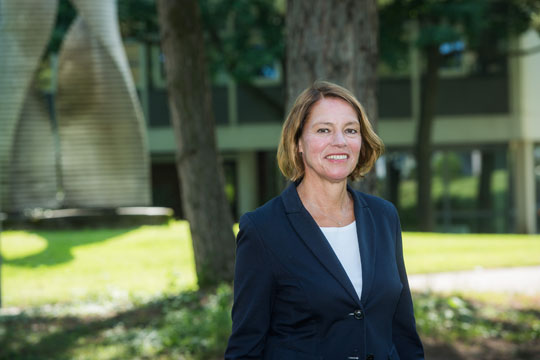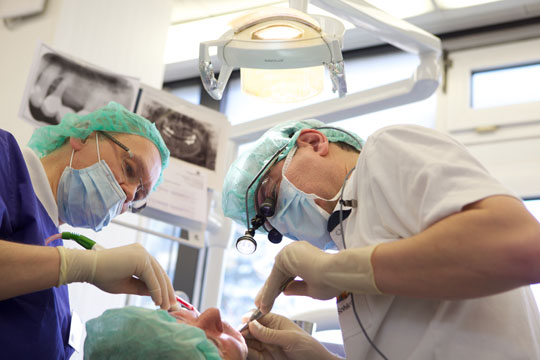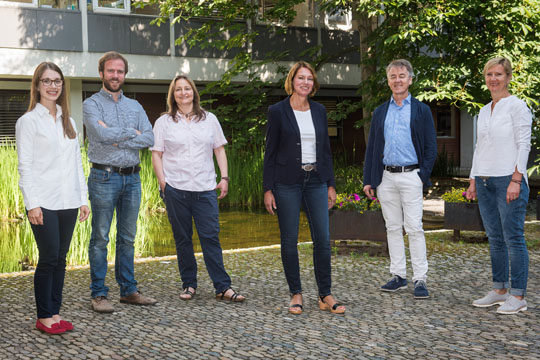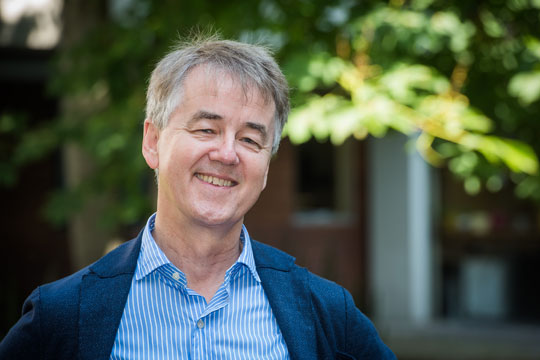A common but underestimated disease
Freiburg, Jul 21, 2017
An inflammation of the gums and the jawbone which holds the teeth in place - periodontitis, a widespread condition. Nearly half the middle-aged people in Germany suffer from it. That means dentists have a great many cases to deal with every day in their surgeries. They can get valuable knowledge on how to treat it at the University of Freiburg. The Periodontology and Oral Implantology Master's degree program has been running for ten years now; it allows dentists to get the extra qualification parallel to working. Program director Professor Petra Ratka-Krüger of the Center for Dental Medicine at the Freiburg Medical Center spoke to Nicolas Scherger about what the course does - and how the disease can be prevented.
 Petra Ratka-Krüger launched Periodontology and Oral Implantology ten years ago. It is the first online Master’s program at the University of Freiburg.
Petra Ratka-Krüger launched Periodontology and Oral Implantology ten years ago. It is the first online Master’s program at the University of Freiburg.
Photo: Klaus Polkowski
Professor Ratka-Krüger, how dangerous is periodontitis?
Petra Ratka-Krüger: Periodontitis has its initial effect in the mouth. It is an inflammation of the gums - which can lead to bone loss and loosening of the teeth or even loss of teeth. Scientific studies have also shown that severe periodontitis can have effects on general health. The relationship between periodontitis and diabetes in particular has been well researched.
How can patients recognize at an early stage that they are affected?
The first symptom is bleeding gums when you clean your teeth. The inflammation leads to greater blood flow through the tissue. The gums swell up and turn a dark red. Bad breath, swelling, and oozing pus can occur, and the teeth may shift - putting a sudden gap where none used to be.
How can the disease be prevented?
The primary cause of periodontitis is microbial plaque. So it's important to practice good oral hygiene. But there are patients who don't keep their mouths very clean and only have a mild inflammation, while others with good oral hygiene may have a severe one. That is because other risk factors come into play, and they determine whether periodontitis arises or not. It's a question of genetics, other general illnesses such as diabetes, and the patient's lifestyle. The main factor we can change is smoking. It also helps to have a balanced diet, to get exercise, and to find ways of reducing stress. Above all it's important to go to the dentist early and regularly, so that he or she can carry out periodontal screening, and start treatment early if it's needed.
Dentists - Is there a great need for them to get further training in this area?
Every dentist realized after one or two years in practise that treating periodontitis is a large part of his or her daily work. But the proportion of training for it in dental medicine studies is relatively small to date. That means we have a great demand for further training. The participants in our Master's program come to us for a variety of reasons. For instance, some aim to get greater in-depth knowledge and develop a core area in their practise, while others want to get surgical training - because there is little operating in the basic dental medicine degree programs. We cover that, too.
 There is a great need for further training for dentists in the field of periodontology; it is little dealt with in basic dentistry studies.
There is a great need for further training for dentists in the field of periodontology; it is little dealt with in basic dentistry studies.
Photo: Baschi Bender
How is it possible to do all that while working?
One of the many good things is that this program uses blended learning - that means that we aim for a didactically sensible combination of traditional classes and contemporary forms of e-learning. So we teach theoretical basics online; the students can study the material at home at a time convenient to them. Practical skills are taught in hands-on courses at the dental hospital as part of required-attendance classes. As I see it, this future-oriented approach is the right one for our subject because it offers the maximum of flexibility in terms of time and location. This is an important factor when it comes to further training.
How are the latest scientific findings which advanced periodontology in the past decade integrated into the program?
We update the material regularly. One focus of our program is the implementation of prophylaxis and treatment concepts for dental practises. In 2016 we overhauled the entire curriculum and developed two new modules. One is dedicated to implantology and periimplantitis - inflammation of an implant. The other is about aesthetics and function. In addition, I hold regular group meetings so as to get feedback fro the participants as to what they think is good or less good. That's the only way forward.
 The team running the online Master’s degree in Periodontology and Oral Implantology is continuing to bring new developments to the course.
The team running the online Master’s degree in Periodontology and Oral Implantology is continuing to bring new developments to the course.
Photo: Klaus Polkowski
How might this further training program develop in the future?
I think that a high level of flexibility is important to our participants. We offer individual modules for which our participants receive a certificate, and anyone who wants to can obtain a Master's degree step by step in this modular system. And we have translated all the teaching materials into English. We want to first further establish the German program with its two new modules and then make it international, most likely in 2018. We have already had enquiries from abroad.
Do Dentistry students get anything out of it?
A few years ago we heard from the students that they would like to see more real-life cases. In our Master's degree program every participant has to write eight case studies. We have prepared some of them as interactive exercise for regular students. The patient introduces himself and talks about his complaints, you see a clinical picture, and the students can come up with a treatment via the examination and diagnosis. We won the University of Freiburg's Teaching Development Prize for this approach. We are currently working on an interactive tool about motivational consultation in which students experience how patients respond to various ways of communication. We can also integrate our experience from the further training program into the basic degree teaching and create e-learning options which we would never otherwise have been able to develop.
www.masterparo.de
______________________________
Dr. Eberhard Frisch has been conducting research and teaching for three years at the Freiburg Medical Center; he is a lecturer in the online Master's program Periodontology and Oral Implantology – and was a member of the first group to take part in the program between 2007 and 2010.
"The course was surprising - and very effective - because it gave you the opportunity to work through the material online even though you were working. I was skeptical it would work - timewise as well as changing one's learning technique - but it turned out amazingly well. With this approach you can complete a fairly complex course of scientific study despite having a heavy professional workload. I worked in the field of Periodontology before that, but obtained a much broader, in-depth knowledge base during my studies. We also got the tools enabling us to answer questions which arose in practice via fast and precise research of the latest scientific literature. Apart from that, I recommend it to many students as a boon that my year meets online in a virtual classroom every two weeks - to present cases and discuss them in this confidential, collegial space.
 Eberhard Frisch completed his habilitation in dental medicine at the University of Freiburg Medical Faculty in May 2017.
Eberhard Frisch completed his habilitation in dental medicine at the University of Freiburg Medical Faculty in May 2017.
Photo: Klaus Polkowski

